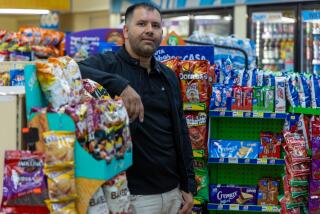PICO-UNION : El Rescate Plans to Open Credit Union
- Share via
Over the past decade, Los Angeles has become a permanent home to hundreds of thousands of Central American refugees who came here fleeing violence in their homelands.
But many of these former refugees, along with other recent Latino immigrants who make ends meet working at one or more relatively low-paying jobs, have so far been unable to establish financial assets in their adopted country.
Few of them have enough of a credit history or a big enough nest egg to open a bank account. To cash their checks, they must often resort to small check-cashing establishments, many of which charge high commission fees and offer little security.
Now, the El Rescate legal and social services center in Pico-Union--in an attempt to meet the changing needs of the population it originally set out to provide emergency aid for 13 years ago--is setting up its own federally insured community credit union. Officials say will be more user-friendly for recent immigrants than are traditional banking establishments.
The credit union, set to open next fall pending federal approval, will provide its members with basic savings accounts and loans. Organizers hope to expand services to include money orders and checking as membership and assets grow.
“Two years ago, we saw that a lot of people we thought would go back (to their home countries) had put down roots, and they needed more than handouts,” said Celia Grail, El Rescate’s executive director. “The people in this community don’t use all the banks around here, so we looked into developing a credit union.”
Recent Latino immigrants fail to establish bank accounts for various reasons, Grail said. Low wages prevent many from saving enough money to meet the minimum deposits required by most banks. Some are paid in cash by their employers and are thus unable to present proof of earnings.
Because they do not earn high enough wages, others do not have access to credit cards and other credit-building mechanisms.
All this, coupled with language barriers and a general mistrust of foreign institutions, serves to keep many recent Latino immigrants from even trying to establish a savings or checking account, or attempting to obtain a loan.
“Banks are not flexible enough,” said Lilian Autler, El Rescate’s community development coordinator. “Most of these people need small loans, such as for funerals, weddings or for when they get sick and have no medical insurance. But most banks are not interested in small loans, because they are not profitable.”
Although El Rescate has not yet determined savings or lending criteria, Autler said, the credit union will consider the number of incomes in an applicant’s household, as well as the applicant’s ability to pay bills, in lieu of credit history.
“They’ll have to demonstrate ability to pay, but we will be more flexible than banks,” Autler said. “We want to encourage people to build up assets.”
El Rescate is soliciting pledges from associations that wish to become credit union members. So far, Comunidades--a network of immigrants from El Salvador who pool funds to aid reconstruction in their hometowns--has joined, as well as the Latino Merchants’ Assn. and Justice for Janitors.
Anyone who wishes to become a credit union member will be able to do so by joining one of the associations affiliated with the credit union, Autler said.
El Rescate expects to submit its application for a federal credit union charter at the beginning of 1995.
More to Read
Sign up for Essential California
The most important California stories and recommendations in your inbox every morning.
You may occasionally receive promotional content from the Los Angeles Times.













